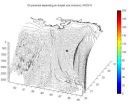Targeting neurotransmitter may help treat gastrointestinal conditions
2012-12-04
(Press-News.org) HERSHEY, Pa. -- Selective targeting of the neurotransmitter that differentially affects brain cells that control the two distinct functions of the pancreas may allow for new medication therapies for conditions like diabetes, dyspepsia and gastro-esophageal reflux, according to Penn State College of Medicine researchers.
"This study differs from what's been reported previously about brain neurons that control the gastrointestinal tract," said R. Alberto Travagli, professor, Department of Neural and Behavioral Sciences, and lead investigator. "It provides further support to the idea that separate nerve pathways regulate the diverse functions of organs along the upper gastrointestinal tract."
The pancreas has two functional parts: one that releases digestive enzymes, and one that releases hormones like insulin and glucagon. The vagus nerve, which originates in the brain, regulates both of these pancreatic functions. This nerve detects chemical and biological changes that occur along the gastrointestinal tract and interprets and integrates these signals before sending appropriate responses back to the organs. In the brain, these signals tell the nerves controlling each specific organ what the proper response is -- for example, digestive processes and insulin release -- according to the signals detected in the GI tract.
Neurotransmitters in the brain and in organs like the pancreas control the nerve networks that receive these signals. Neurotransmitters are chemicals released from nerves that allow them to communicate with each other as well as with organs of the body. One of these neurotransmitters is glutamate, which acts on specific proteins called receptors that are present on the nerve cells. There are different classes and types of receptors that glutamate can act upon; one major class of these receptors is metabotropic glutamate receptors (mGluRs). This class is further divided into three subgroups -- I, II or III -- depending on their location and function on the nerve cells.
"The aim of this study was to investigate how these mGluRs are organized on nerve synapses -- the specialized structures that allow a signal to pass from one cell to another cell," Travagli said. "The second aim of the study was to see whether pancreatic insulin and enzyme secretions are controlled by different types of vagal motoneurons -- the cells of the nervous system that control motor functions of the pancreas through the vagus nerve."
Group II and III mGluRs are present in synapses that can either excite or inhibit the vagal nerve cells that send signals to the pancreas, and different outcomes can be seen depending on which group of mGluRs glutamate acts upon. When glutamate acts upon either group II or group III mGluR, insulin secretion is decreased. Pancreatic enzyme secretion is increased only by activation of group II mGluR by glutamate.
"The data shows mGluRs on brainstem vagal nerve circuits that regulate pancreatic functions are organized in a very specific manner," Travagli said. "This type of separation in their organization may allow for development of selective drugs that target very specific vagal neurocircuits in patients with such conditions as gastrointestinal reflux disorders, functional dyspepsia, gastroparesis and pancreatic exocrine or endocrine dysfunctions."
###
Researchers published results in a recent issue of The Journal of Physiology.
Other researchers who participated in this study are Tanja Babic, Kirsteen N. Browning, Yasunori Kawaguchi and Xiaorui Tang from the Department of Neural and Behavioral Sciences.
This research was funded through grants from National Science Foundation and the National Institutes of Health.
**mgs**
ELSE PRESS RELEASES FROM THIS DATE:
2012-12-04
AUSTIN, Texas — With fluctuating gas prices and the increasing call for work-life balance, telecommuting has become an attractive option for busy professionals. Yet according to a new study from The University of Texas at Austin, for most employees who work remotely, telecommuting equates to working more hours.
The study, co-authored by Jennifer Glass, professor in the Department of Sociology and the Population Research Center, shows that most of the 30 percent of respondents who work from home add five to seven hours to their workweek compared with those who work exclusively ...
2012-12-04
Researchers at the University of Iowa have documented an activity by infants that begins nearly from birth: They learn by taking inventory of the things they see.
In a new paper, the psychologists contend that infants create knowledge by looking at and learning about their surroundings. The activities should be viewed as intertwined, rather than considered separately, to fully appreciate how infants gain knowledge and how that knowledge is seared into memory.
"The link between looking and learning is much more intricate than what people have assumed," says John Spencer, ...
2012-12-04
This press release is available in French. These results reveal how the immune system can then limit the effectiveness of some cancer chemotherapies. The researchers now intend to block the molecules responsible for negative immune system activation to increase the efficiency of chemotherapy. A clinical trial to test this hypothesis should begin very soon.
Chemotherapy is one of the most frequently used treatments to eliminate cancerous cells. These drugs kill all cells that are multiplying, or block their proliferation (for example, cells responsible for hair growth, ...
2012-12-04
MIAMI — December 4, 2012 - The 2010 blowout of the Macondo well in the waters of the Gulf of Mexico resulted in the region's largest oil spill in U.S. history. As the Deepwater Horizon (DWH) incident unfolded, in an effort to prevent the oil from coming to the surface and reaching coastal and marsh ecosystems, chemical dispersants were injected at the wellhead. These powerful dispersants, typically used to break up oil slicks at the sea surface had never been used in such large quantities and over such a prolonged period of time in the deep ocean.
A new study published ...
2012-12-04
A new study released this week confirms that lions are rapidly and literally losing ground across Africa's once-thriving savannahs due to burgeoning human population growth and subsequent, massive land-use conversion. Representing the most comprehensive assessment of the state and vitality of African savannah habitat to date, the report maintains that the lion has lost 75% of its original natural habitat in Africa – a reduction that has devastated lion populations across the continent.
Co-authored by Panthera's Lion Program Survey Coordinator, Dr. Philipp Henschel, and ...
2012-12-04
1. American College of Physicians Says Upper Endoscopy Overused in Patients with Reflux
Routine use of upper endoscopy for most patients with gastroesophageal reflux disease (GERD) does not improve patient health, is associated with preventable harms, and may lead to unnecessary interventions and costs, says the American College of Physicians (ACP) Clinical Guidelines Committee in a new evidence-based clinical policy paper. Heartburn, a symptom of GERD, is a common reason for people to see a doctor. Long term complications of GERD can include scarring of the esophagus ...
2012-12-04
PHILADELPHIA, December 4, 2012 -- Heartburn is one of the most common reasons for people to see a doctor, and some physicians often use upper endoscopy to diagnose and manage gastroesophageal reflux disease (GERD). But most patients do not require the procedure unless other serious symptoms are present, according to the American College of Physicians (ACP) Clinical Guidelines Committee in a new evidence-based clinical policy paper published today in Annals of Internal Medicine.
"The evidence indicates that upper endoscopy is indicated in patients with heartburn only when ...
2012-12-04
Hamilton, ON (Dec. 3, 2012) - A heart-healthy diet rich in fruits, vegetables and fish significantly reduces the chance of a second heart attack and stroke in people with cardiovascular disease, McMaster University researchers have found.
A five-year study of almost 32,000 patients (average age 66.5 years) in 40 countries discovered those who ate a heart-healthy diet had a:
35 per cent reduction in risk for cardiovascular death
14 per cent reduction in risk for new heart attacks
28 per cent reduction in risk for congestive heart failure
19 per cent reduction ...
2012-12-04
If you have cardiovascular disease, a heart-healthy diet may help protect you from recurrent heart attacks and strokes, according to new research in the American Heart Association journal Circulation.
"At times, patients don't think they need to follow a healthy diet since their medications have already lowered their blood pressure and cholesterol — that is wrong," said Mahshid Dehghan, Ph.D., study author and a nutritionist at the Population Health Research Institute, McMaster University in Hamilton, Ontario, Canada. "Dietary modification has benefits in addition to those ...
2012-12-04
Social media may be an effective tool to help children overcome obesity, according to a new American Heart Association scientific statement.
The statement is published online in the association's journal Circulation.
"Online communication and social media are an increasing part of our lives and our overall social network of family, friends and peers," said Jennifer S. Li, M.D., M.H.S., chair of the writing group. "Healthcare providers should embrace its potential as a tool for promoting healthy behavioral change."
The writing group evaluated research on Internet-based ...
LAST 30 PRESS RELEASES:
[Press-News.org] Targeting neurotransmitter may help treat gastrointestinal conditions


